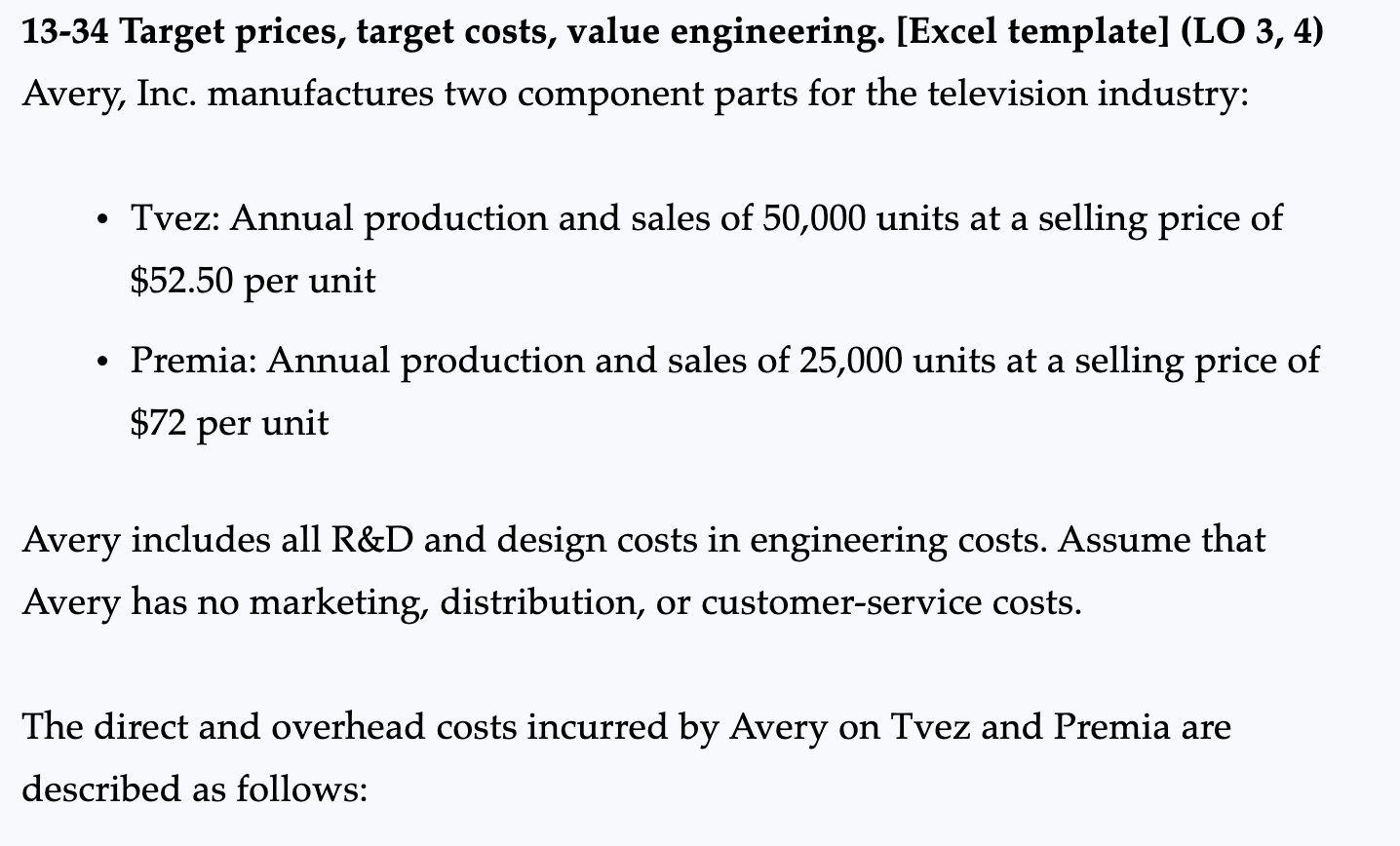
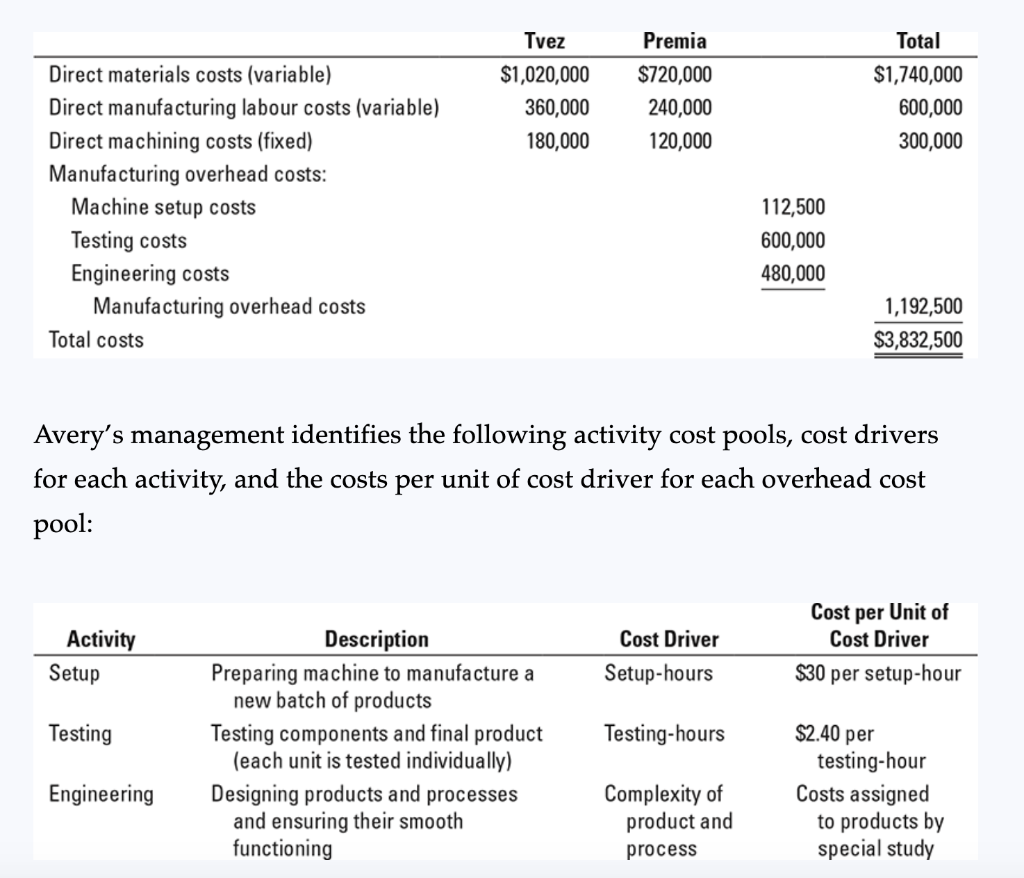
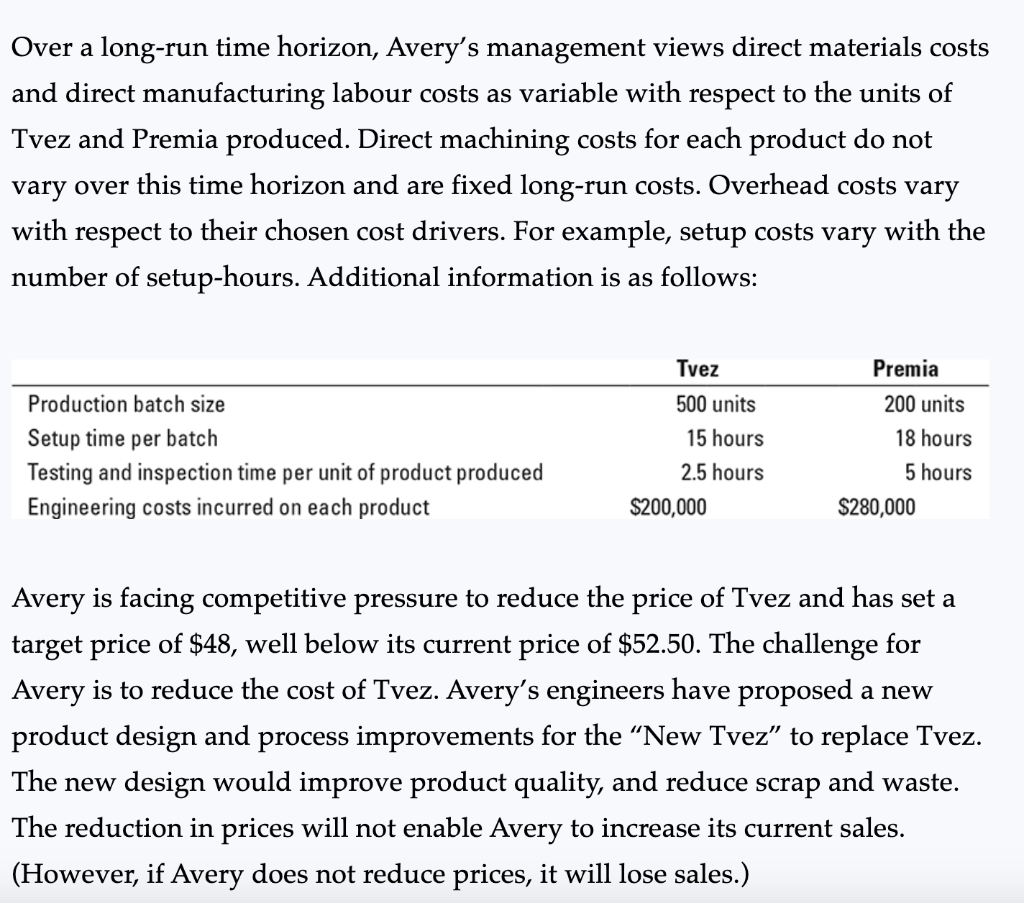
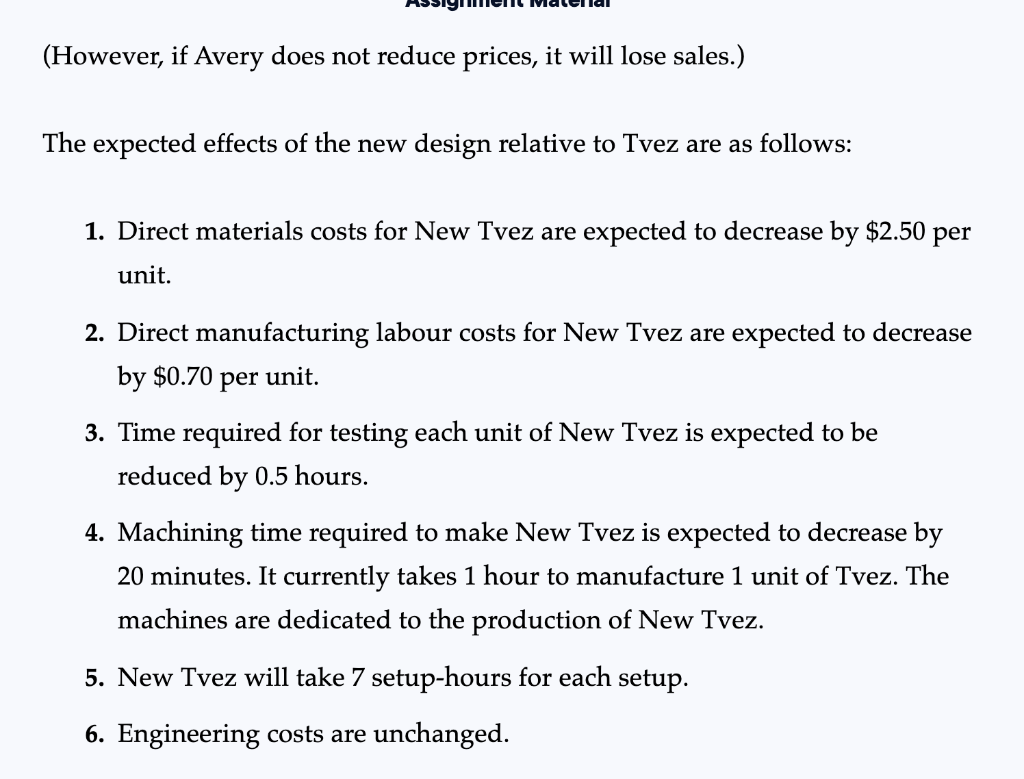
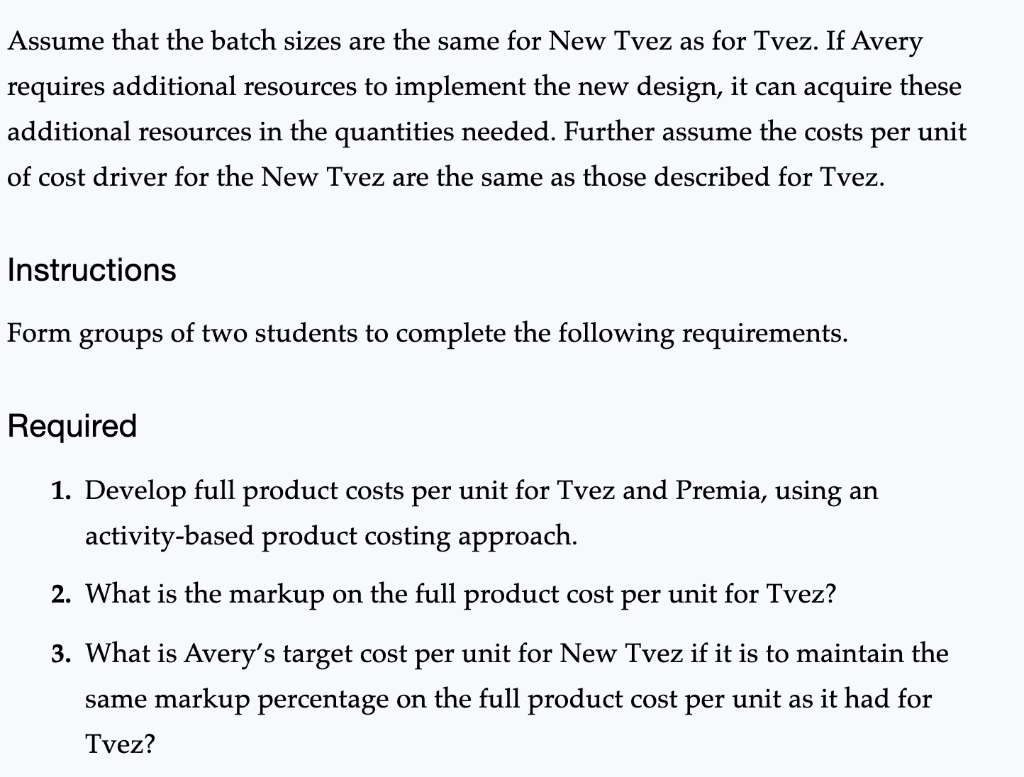
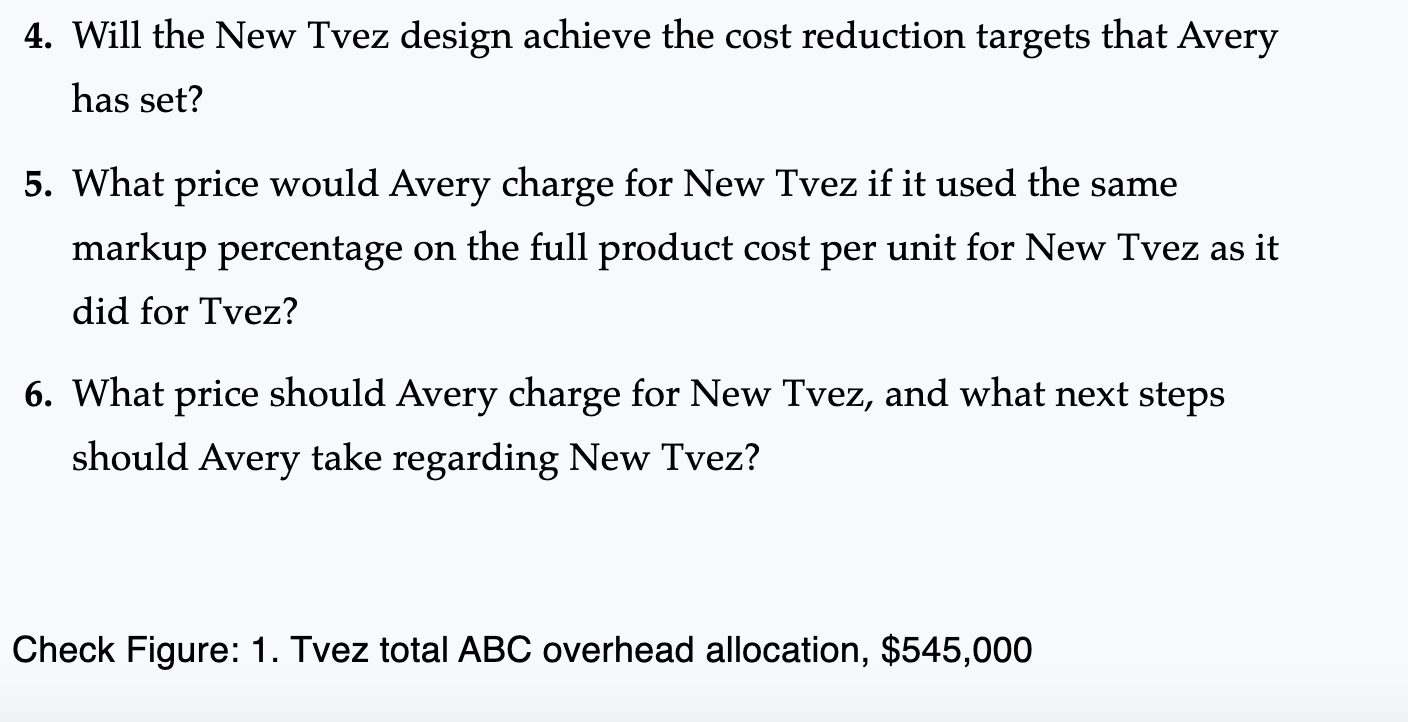
13-34 Target prices, target costs, value engineering. [Excel template) (LO 3, 4) Avery, Inc. manufactures two component parts for the television industry: Tvez: Annual production and sales of 50,000 units at a selling price of $52.50 per unit Premia: Annual production and sales of 25,000 units at a selling price of $72 per unit Avery includes all R&D and design costs in engineering costs. Assume that Avery has no marketing, distribution, or customer-service costs. The direct and overhead costs incurred by Avery on Tvez and Premia are described as follows: Tvez $1,020,000 360,000 180,000 Premia $720,000 240,000 120,000 Total $1,740,000 600,000 300,000 Direct materials costs (variable) Direct manufacturing labour costs (variable) Direct machining costs (fixed) Manufacturing overhead costs: Machine setup costs Testing costs Engineering costs Manufacturing overhead costs Total costs 112,500 600,000 480,000 1,192,500 $3,832,500 Avery's management identifies the following activity cost pools, cost drivers for each activity, and the costs per unit of cost driver for each overhead cost pool: Activity Setup Cost Driver Setup-hours Cost per Unit of Cost Driver $30 per setup-hour Testing Description Preparing machine to manufacture a new batch of products Testing components and final product (each unit is tested individually) Designing products and processes and ensuring their smooth functioning Testing-hours Engineering Complexity of product and process $2.40 per testing-hour Costs assigned to products by special study Over a long-run time horizon, Avery's management views direct materials costs and direct manufacturing labour costs as variable with respect to the units of Tvez and Premia produced. Direct machining costs for each product do not vary over this time horizon and are fixed long-run costs. Overhead costs vary with respect to their chosen cost drivers. For example, setup costs vary with the number of setup-hours. Additional information is as follows: Production batch size Setup time per batch Testing and inspection time per unit of product produced Engineering costs incurred on each product Tvez 500 units 15 hours 2.5 hours $200,000 Premia 200 units 18 hours 5 hours $280,000 Avery is facing competitive pressure to reduce the price of Tvez and has set a target price of $48, well below its current price of $52.50. The challenge for Avery is to reduce the cost of Tvez. Avery's engineers have proposed a new product design and process improvements for the New Tvez to replace Tvez. The new design would improve product quality, and reduce scrap and waste. The reduction in prices will not enable Avery to increase its current sales. (However, if Avery does not reduce prices, it will lose sales.) (However, if Avery does not reduce prices, it will lose sales.) The expected effects of the new design relative to Tvez are as follows: 1. Direct materials costs for New Tvez are expected to decrease by $2.50 per unit. 2. Direct manufacturing labour costs for New Tvez are expected to decrease by $0.70 per unit. 3. Time required for testing each unit of New Tvez is expected to be reduced by 0.5 hours. 4. Machining time required to make New Tvez is expected to decrease by 20 minutes. It currently takes 1 hour to manufacture 1 unit of Tvez. The machines are dedicated to the production of New Tvez. 5. New Tvez will take 7 setup-hours for each setup. 6. Engineering costs are unchanged. Assume that the batch sizes are the same for New Tvez as for Tvez. If Avery requires additional resources to implement the new design, it can acquire these additional resources in the quantities needed. Further assume the costs per unit of cost driver for the New Tvez are the same as those described for Tvez. Instructions Form groups of two students to complete the following requirements. Required 1. Develop full product costs per unit for Tvez and Premia, using an activity-based product costing approach. 2. What is the markup on the full product cost per unit for Tvez? 3. What is Avery's target cost per unit for New Tvez if it is to maintain the same markup percentage on the full product cost per unit as it had for Tvez? 4. Will the New Tvez design achieve the cost reduction targets that Avery has set? 5. What price would Avery charge for New Tvez if it used the same markup percentage on the full product cost per unit for New Tvez as it did for Tvez? 6. What price should Avery charge for New Tvez, and what next steps should Avery take regarding New Tvez? Check Figure: 1. Tvez total ABC overhead allocation, $545,000












